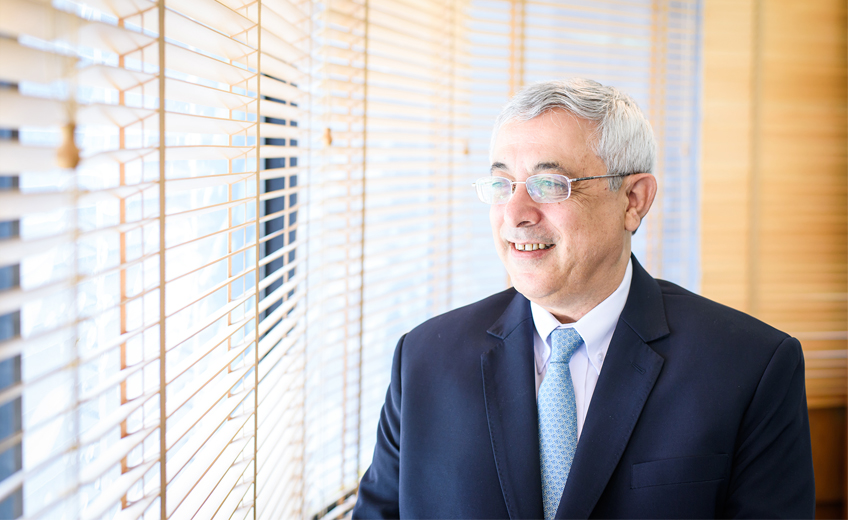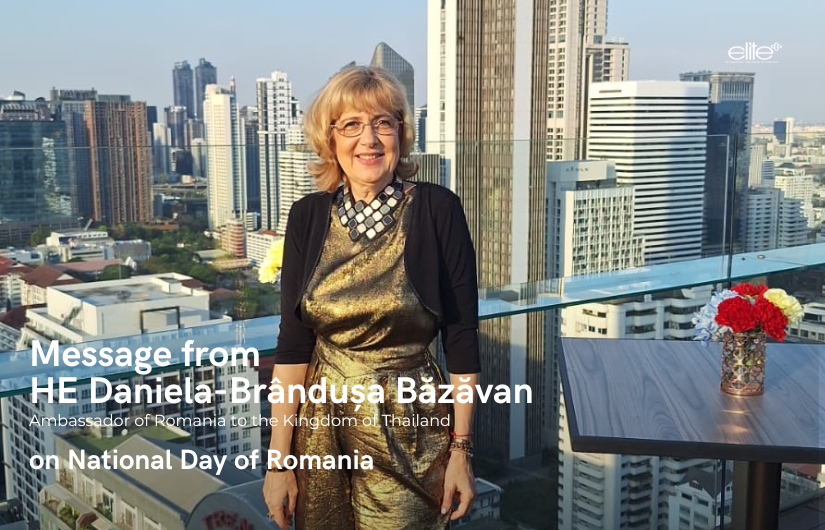Since official diplomatic and cultural ties between Thailand and Israel were established in 1954, the cordial and fruitful relationship has grown stronger and more promising. With the Israeli embassy in Bangkok established in 1958 and the Thai embassy in Tel Aviv in 1996, the two countries cooperate in many fields, including medical, trade, agrotechnology and water management, as well as arts, culture and education.
Ambassador Meir Shlomo, the Israeli ambassador to Thailand since August 2017, with over 30 years of experience in Israel’s Ministry of Foreign Affair, talked to Elite+ about current collaborations between Thailand and Israel and shed light on some of the many potential bilateral efforts in the works.
- How far do diplomatic relations between Thailand and Israel go back?
We established diplomatic relations in 1954, and at the beginning there was an embassy here, and the Embassy of Thailand in Rome was in charge of Israel. Then a few years later they put an embassy in Israel also, so we’ve had a great relationship since then. You have a very good ambassador. She’s very active. She also started about a year ago, around the same time that I started here.
- What are some of the prominent connections between us?
Thailand is the number two most popular destination for Israeli tourists, after New York. We have approximately 200,000 Israelis visiting Thailand every year, which is not a big number for Thailand, but for Israel it’s a very big number and represents 2 per cent of the population. We also have 25,000 Thai workers in Israel, and when they come back we regard them as ambassadors of Israel to Thailand because they bring back all their experiences.
And we also have a very good governmentto-government relationship, within the political echelon and the security establishment. Recently we just signed a cooperation agreement between the Ministry of Defence of Israel and the Ministry of Defence in Thailand. We have a political dialogue through the Ministry of Foreign Affairs and a strategic dialogue with the national security councils of both countries. We have a joint commission also on the government level every year to check all the issues that come up with the Thai workers in Israel, and if there is a problem, it is addressed properly.
- What about trade and commerce?
It’s growing bit by bit but steadily. We are trying to promote a free-trade agreement between Israel and Thailand, which would be very, very important because that would be a platform that would enable both sides to increase their commerce with each other. We just completed phase number one, which was a feasibility study by the Thai side, and they came out with the conclusion that it is a good idea. Last June we had a joint trade commission in Israel between the Ministry of Commerce of Thailand and the Ministry of Commerce in Israel, headed by the permanent secretary of the Ministry of Commerce, in order to get this free-trade agreement to the next phase.

- What are the biggest imports and exports between the two countries?
The beautiful thing when it comes to commerce between Thailand and Israel is that these are not competing economies and they are complementing each other. So whatever we are good at, you don’t export any of, and whatever you export, we don’t export anyway – it’s a match made in heaven! We buy from Thailand mostly machinery and cars and then we export technology, such as irrigation and water treatment, software for the high-tech industry and a little bit of chemicals to Thailand.
This is why we think that we can be very instrumental in both of the major projects of Thailand: Thailand 4.0 and the Eastern Economic Corridor. Take Thailand’s prime export – cars – for example. With our unique know-how and reliable technology, we can work together to install smart systems to your export. We have good wishes. We are not big like Japan or China, but we have things that we can do pretty well. So there’s good potential.
- How would the free-trade agreement enhance trade between the two countries?
We project that there would be a flow of investment on both sides. Actually Thai companies in the last two years started to become interested in sending delegations of potential investors to Israel. We just had last year Siam Cement Group going to Israel a couple of times, and I think in a couple of weeks one of the electricity companies, Bangchak Energy, is also going to Israel for the same purpose
The idea is that you take a lot of the obstacles out of the way of the exporters on both sides, whether it would be bureaucracy, paperwork, or all kinds of regulations that you don’t really need. Also one should remember that we have practically a free-trade agreement with most ASEAN countries already, so that puts Thailand in an uncomfortable position as far as the Israeli market is concerned, because if tomorrow you want to sell a can of tuna to Israel you have to pay customs duty, but if the Vietnamese sell the same tuna they don’t have to pay the taxes because we have a free-trade agreement. So that would bring Thailand at least to the same level, with a lack of customs, so I don’t see any reason why Thailand shouldn’t have the same position as far as the Israeli market is concerned, but we need to have this free-trade agreement.
Investors on both sides would feel more secure and can invest more in each other’s countries. There’s a lot of potential on both sides, and our job is to make sure that there are no obstacles on the way. So both myself here and the Thai ambassador in Israel are working on that, with the ministries. I am confident we will go as quickly as possible. Now almost everybody wants a free-trade agreement with Thailand. Thailand became very popular!
What about tourism? Is Thailand popular among Israeli travellers? Yes. About 200,000 Israelis visit Thailand every year, and it’s mainly for leisure. They usually spend a few days in Bangkok, then go south to the beaches or head north for Chiang Mai. The interesting thing is that Thailand started as a backpackers’ destination, but after the third generation of backpackers came and went, parents with kids and families started to come. So now Thailand is mostly a family destination, which is good for Thailand because they spend more money than backpackers.
- Do a lot of Thais visit Israel?
For that, we are not doing very well. Most Thais go to Israel for business. I think part of the problem is that Thai Airways does not fly to Israel. We’ve just had Air India flying direct from New Delhi to Tel Aviv, and we found that when a local airline offers direct flights, the number of leisure visitors from that country to Israel increases. In China, Yunnan Airways offers 14 flights to Tel Aviv a week and we see a lot of Chinese visiting Israel. Now Bangkok has seven direct flights [to Israel] operated by El Al. Another Israeli airline will add another three flights per week, two to Bangkok and one to Phuket. So soon we’ll have 10 direct flights per week, but it’s still not enough. And the direct flights are always full! I wish Thai Airways would fly to Israel directly; that would be great and I am sure that would please Thais.
- What can one expect from a trip to Israel?
What would you recommend visitors see or do? The beautiful thing in Israel is that it is a very small country and you can do a lot in a very short time. It takes six hours to get from the north to the south, and only about 30 minutes from the east to the west. But in this tiny country we have great beaches, great desert scenery and mountains also. And we have, of course, a lot of history. There’s a lot of Christians who go from Thailand to Israel. Jerusalem has been there for 3,000 years; it’s the point where three monotheistic religions come through to see the holy places. You can take seven or eight days in Israel and you can see everything. Israel has not yet become one of the obvious destinations for Thai tourists, unlike a lot of European countries. But I believe that a lot of people now want to explore different places, so Israel can very well become the new destination for Thai tourists.
- What about other cultural exchanges between Thailand and Israel?
We give 120 scholarships every year for Thais to go to Israel to study agricultural subjects. We bring here as many artists as we can. We just had a piano concert here four months ago, and we’re going to bring a big dance group in November. We’re also going to put some Israeli movies out there. Of course, we are limited in our resources like all governments are, but we try to bring as much as we can.
- How can Thailand and Israel strengthen relations further in the future?
I wish there would be more Thais going to Israel as tourists, because the best way to learn about another country is with first-hand experience, so my dream would be to see as many Thais going to Israel as Israelis come to Thailand. I think people-to-people is a very important connection. It’s not enough to have only government-to-government and diplomats-to-diplomats. That’s good, but it’s never enough.
In terms of the government-to-government relationship, first and foremost we have to achieve this free-trade agreement in the next two years. I think this is something huge that both governments could do for the private sector, to enable citizens to prosper. The goodwill between them is there, as always. Bringing someone from Israel to Thailand is the easiest sell. I just say, “We’re willing to have you here in Thailand,” and I get a yes in no time!





























































































































































































































































































































































































































































































































































































































































































































































































































































































































